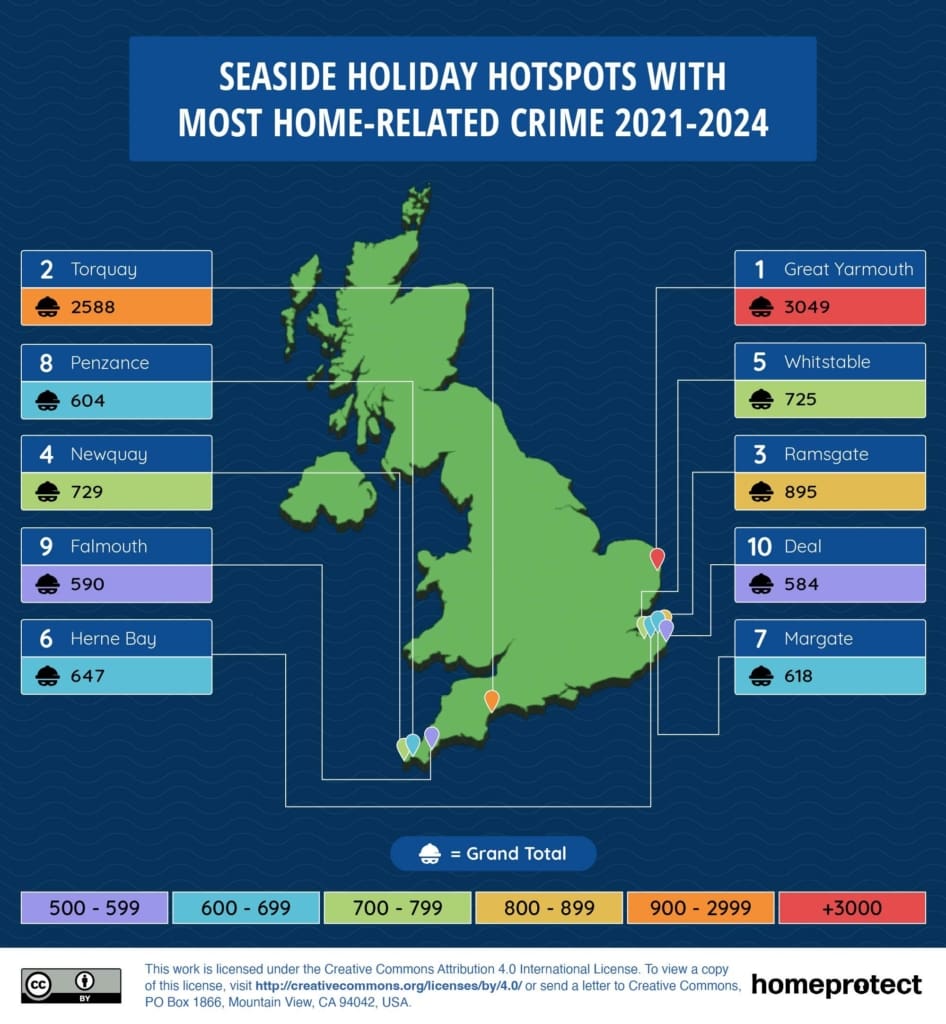Surprising Summer Staycation Crime Stats – Here’s How to Protect Your Holiday Rental

If you already have a second home that you’re considering renting out this year, or you’re looking to buy a property to turn it into a holiday rental – these tips are for you!
As the summer holidays are here, many of us are eagerly packing our bags, ready to enjoy what might be the last of the summer weather with some well-deserved relaxation by the sea. But a recent study we conducted has revealed a surprising trend: over a third of all home-related crimes occur during the summer months in some of the UK’s most popular seaside holiday spots.
So, if you’re heading to the coast to enjoy the final few weeks of the summer holidays, it’s worth taking a moment to learn how you can protect yourself and your holiday rental.
The Rise of UK Seaside Holidays
This year, domestic holidays are all the rage, with Brits opting to explore the beauty of their own country rather than jetting off abroad. While this trend might be a relief for European destinations like Greece and Majorca that are struggling with overtourism, it’s leading to a noticeable increase in tourist numbers at British seaside hotspots.
The Study: A Closer Look at the Numbers
Analysing crime data from 2021 to 2024, we found that over a third (36.1%) of all home-related crimes in these holiday hotspots occur during the summer months. This statistic challenges the common belief that winter is the peak season for such incidents.
Among the seaside towns examined, Great Yarmouth emerged as the most affected, with 3,049 home-related crimes reported over the past three years. These included 2,382 cases of criminal damage and arson, and 667 burglaries. Torquay followed closely with 2,588 incidents, while Ramsgate reported 895 crimes, completing the top three.
Other towns making the list include Newquay with 729 crimes, Whitstable with 725, and Herne Bay with 647 incidents over the same period. These figures highlight the importance of being vigilant, even when you’re on holiday.

Top Tips to Keep Your Holiday Safe
Whether you’re staying in a cosy cottage or a beachside apartment, here’s how you can protect yourself and your belongings during your staycation:
1. Prioritise Security
Make sure your holiday rental is as secure as your own home. Check that all doors and windows are locked, keep valuables out of sight, and ensure that security systems like cameras and alarms are working.
If you notice any issues with locks or other security features, report them to the property owner immediately.
Remember, failing to secure the property could not only increase your risk but also potentially make you liable for any damages.
2. Be Cautious with Social Media
Sharing your holiday snaps on social media might seem harmless, but it could also tip off potential burglars that your rental is unattended. It’s best to wait until you’re back home to post those envy-inducing beach photos.
3. Check Your Insurance
Even with the best precautions, sometimes things can still go wrong. It’s important to know what your insurance covers.
While the property owner’s insurance may cover the building itself, it likely won’t cover your personal belongings. Check your home insurance policy to see if it extends to items stolen from a holiday rental.
Additionally, travel insurance may provide extra protection for theft or loss during your stay.
For holiday homeowners, ensuring you have the right insurance policy is crucial. Many standard home insurance policies don’t cover holiday rentals or second homes, so it’s worth contacting your insurer to make sure you’re fully protected.
Methodology
To identify the most crime-prone seaside holiday hotspots, Homeprotect used Which? Magazine’s list of the best seaside holiday destinations, focusing on the top five counties with the most popular towns: Cornwall, Devon, Kent, Dorset, and Norfolk. Many of these areas also align with Government data on where in the country the most vacant or 2nd homes are located.
Large towns and cities with populations over 70,000 were excluded to ensure the data was representative of typical seaside resorts. Alternatively, Police methodologies for their data for Plymouth, St Mawes, Folkestone, Bournemouth and Weymouth changed during the period we were comparing.
The study analysed Police crime data from May 2021 to April 2024, specifically looking at burglary and criminal damage/arson incidents during the summer months (May to August). The data was meticulously filtered to ensure accuracy in representing the crime rates in each town.
The Bottom Line
Just by taking a few simple precautions, you can enjoy your summer break. Safe travels!
